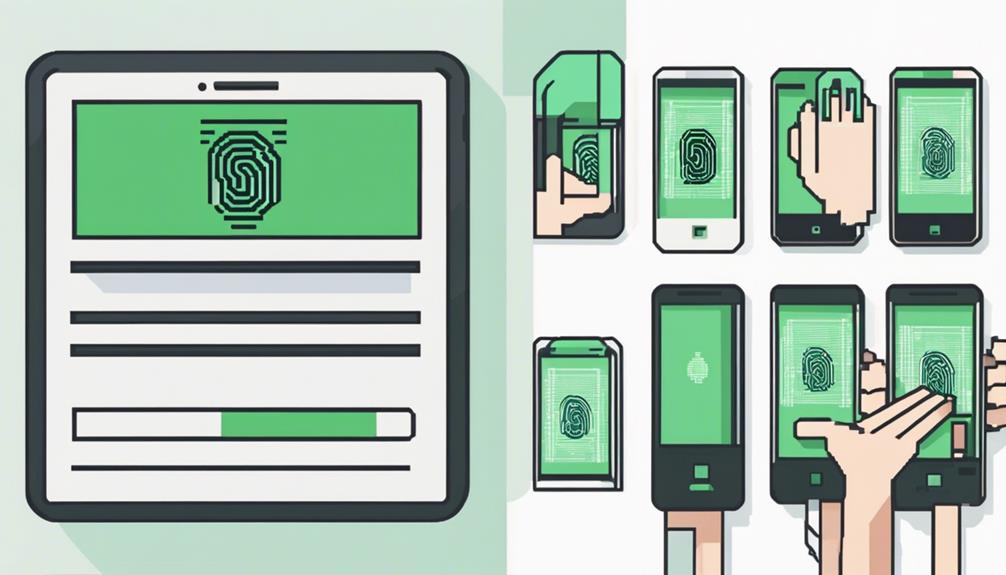Protect your phone from hackers by optimizing passcode security with a secure six-digit code and biometric features. Safeguard personal data in secure locations, steer clear of public Wi-Fi risks, and update software regularly for enhanced security. Secure data backups with encryption and consider remote locking and wiping features in case of theft. Taking these steps fortifies your phone's defenses against cyber threats.
Key Takeaways
- Use a secure six-digit passcode and biometric authentication.
- Avoid public Wi-Fi for sensitive tasks; utilize VPN for added security.
- Regularly update software for vital security patches.
- Enable remote locking and wiping features for data protection.
- Backup data with encryption on secure cloud storage.
Implement Strong Passcode Measures
To enhance the security of your phone and protect it from hackers, it is essential to implement strong passcode measures. When setting up a passcode, opt for a secure six-digit combination that includes a mix of numbers and special characters. Avoid common and easily guessable codes like '1234' or birthdates, as they can compromise the security of your device.
In addition to a robust passcode, consider utilizing biometric authentication methods such as fingerprint or facial recognition for an added layer of protection. These features make it more challenging for unauthorized users to access your phone without your consent.
Furthermore, enable the auto-lock feature on your phone to automatically secure it when not in use, preventing potential breaches of your data.
Regularly updating your passcode and refraining from sharing it with others are also vital steps to maintain the overall security of your device. By implementing these measures, you can significantly reduce the risk of unauthorized access to your phone.
Utilize Biometric Security Features

Biometric security features such as fingerprint, facial recognition, and iris scanning offer unique and secure ways to access your phone. These methods are more secure than traditional passwords as they rely on physical characteristics that are challenging to duplicate.
With high accuracy rates and encrypted data storage, biometrics enhance privacy and provide convenient access without the hassle of remembering complex passwords.
Biometric Security Overview
Smartphone users can enhance the security of their devices by leveraging advanced biometric security features such as fingerprint recognition and facial scanning.
Biometric security features like fingerprint, facial recognition, and iris scanning provide unique and secure ways to access your phone.
Biometric authentication is more secure than traditional password methods, as it relies on physical characteristics that are difficult to replicate.
Biometric data is encrypted and stored securely on the device, enhancing privacy and reducing the risk of unauthorized entry.
Biometric security offers convenience and quick entry to your phone without the need to remember complex passwords.
Major smartphone manufacturers like Apple and Samsung have integrated biometric security features into their devices to enhance user protection.
Biometric Authentication Methods
Incorporating advanced biometric authentication methods into your device's security settings can greatly enhance protection against unauthorized access attempts.
Biometric authentication, such as fingerprint scanning, facial recognition, and iris scanning, offers secure ways to access your phone. These features are unique to each individual, making them difficult for hackers to replicate.
By utilizing biometric security features, you add an extra layer of security beyond traditional password or PIN methods. The biometric data used for authentication is securely stored on the device, ensuring that it is not easily accessible to external parties.
These methods help safeguard your personal information and protect your phone from unauthorized access attempts. With biometric authentication, you can feel confident that your device is secure and that your data is well-protected against potential threats.
Benefits of Biometrics
Utilizing advanced biometric security features on your device offers unparalleled protection against unauthorized access attempts.
Biometric security, such as fingerprint and facial recognition, provides a unique and secure way to access your phone, surpassing traditional passwords in terms of protection. The biometric authentication process relies on physical characteristics that are challenging to replicate, enhancing privacy and safeguarding against hacking attempts.
Additionally, biometric data is encrypted and securely stored on the device, further bolstering the protection of sensitive information.
Apart from the robust security measures, biometric authentication also enhances user experience by being faster and more convenient than entering a passcode.
Many smartphones now come equipped with biometric security options as a standard feature, reflecting the industry's commitment to improving overall device security for users.
Safeguard Personal Information

Securing personal information is paramount in safeguarding your phone from potential hackers and data breaches. To protect sensitive data, it is advisable to store personal information like social security numbers and banking details in a separate, safe location outside your phone. Avoid storing such sensitive information on your device to prevent unauthorized access and data breaches. Refrain from sharing personal details such as passwords and financial information on unsecured platforms or networks, as this can lead to data theft. Additionally, exercise caution when entering personal details on public Wi-Fi networks to prevent potential hacking incidents.
To keep personal information secure, utilize strong passwords, encryption, and secure storage methods. By implementing these practices, you can enhance the security of your personal data and reduce the risk of falling victim to hackers or data breaches. Remember, proactive measures play an important role in maintaining the privacy and security of your personal information.
Avoid Public Wi-Fi Risks

Using public Wi-Fi networks poses significant risks to the security of your data and personal information. When connecting to public Wi-Fi, hackers can easily intercept data, putting your sensitive information at risk.
To protect yourself, follow these expert tips:
- Avoid sensitive activities: Refrain from accessing sensitive information like online banking or entering passwords while using public Wi-Fi networks.
- Disable auto-connect features: Turn off Wi-Fi auto-connect and Bluetooth when not in use to prevent unauthorized access to your device.
- Secure your personal hotspot: If you use a personal Wi-Fi hotspot, make sure it is protected with a strong password to safeguard your data from potential hackers.
- Utilize a VPN: Enhance your security by using a Virtual Private Network (VPN) when connecting to public Wi-Fi networks. A VPN encrypts your internet traffic, making it harder for hackers to intercept your data.
Regularly Update Software

To maintain the security of your phone and protect it from potential vulnerabilities, regularly updating the software is essential. Software updates not only enhance system performance and stability but also provide vital security patches to safeguard your device against malicious software. Cybercriminals often target outdated software to exploit weaknesses and gain unauthorized access to sensitive data stored on your phone. By setting your phone to automatically download and install software updates, you guarantee that your device is equipped to defend against evolving threats effectively.
| Benefits of Regular Software Updates |
|---|
| Enhanced system performance |
| Improved security with patches |
| Protection against malicious software |
Keeping your phone's software up to date is a fundamental aspect of maintaining phone security and thwarting potential hacker attacks. Stay proactive in updating your phone to fortify its defenses and safeguard your data.
Secure Your Data Backups

To secure your data backups, it is essential to encrypt your backup data and utilize secure cloud storage options.
Encrypting your backups adds an extra layer of protection against potential breaches, while secure cloud storage guarantees that your data is safeguarded in case of any security threats.
Encrypt Backup Data
Encrypting backup data is a crucial step in safeguarding your information from unauthorized access and guaranteeing the security of your personal files. When it comes to securing your data backups, consider the following:
- Backup encryption: Convert your information into a code that only authorized users can decipher.
- Secure data: Prevent hackers or data breaches from accessing sensitive data stored in your backups.
- Protect personal information: Assure your personal data, photos, and files remain safe in case of device theft or loss.
- Encryption tools: Utilize encryption tools provided by your device's operating system or reputable third-party software for effective protection.
Use Secure Cloud Storage
Consider leveraging secure cloud storage for safeguarding your data backups against unauthorized access and guaranteeing data recovery in case of phone security breaches.
Secure cloud storage services, such as Google Drive and iCloud, employ data encryption to protect information from being accessed by unauthorized parties. By backing up your data to the cloud, you can easily retrieve it in situations like phone loss or hacking incidents.
Cloud storage providers implement robust security measures to prevent data breaches and assure the safety of your information. Utilizing cloud storage for automatic backups not only protects your data but also enables seamless data recovery on your phone, offering a convenient and reliable solution for safeguarding your valuable information.
Make the most of secure cloud storage options to keep your data safe and accessible, providing peace of mind in an increasingly digital world.
Employ Remote Locking/Wiping Features

Utilize remote locking and wiping features such as Find My iPhone or Find My Device to enhance the security of your phone in case of loss or theft. These tools offer a quick and effective way to secure your device and protect your data from falling into the wrong hands.
Here are some key points to keep in mind:
- Remote locking: Activate this feature to prevent unauthorized access to your phone if it goes missing.
- Remote wiping: In case your phone gets stolen, use remote wiping to erase all sensitive information remotely.
- Data protection: These features guarantee that your personal information remains safe and inaccessible to anyone without your permission.
- Peace of mind: By setting up remote locking and wiping in advance, you can act swiftly in emergencies, giving you reassurance that your data is secure.
Frequently Asked Questions
What Protects My Phone From Hackers?
Various security measures safeguard phones from hackers, including strong passcodes, biometric authentication, two-factor authentication, regular software updates, secure Wi-Fi networks, antivirus software, and data backups. Utilizing features like Find My iPhone enhances protection against unauthorized access and data breaches.
Can You Remove a Hacker From Your Phone?
Yes, you can remove a hacker from your phone by performing a factory reset to eliminate any malicious software or unauthorized access. It's important to back up important data before resetting and consider installing antivirus software for protection.
How Do I Make My Phone More Secure?
To enhance the security of your phone, implement strong passwords, update software regularly, avoid unsecured Wi-Fi networks, use features like Find My iPhone, consider antivirus software and VPNs. These measures create multiple layers of defense against potential hacking threats.
What's the Best Thing to Do When Your Phone Has Been Hacked?
When your phone has been hacked, take immediate action by disconnecting from the internet, changing passwords, scanning for malware, contacting your mobile service provider, and enabling two-factor authentication. Safeguard your sensitive information and prevent further breaches.
Conclusion
To sum up, by following the expert advice outlined above, you can guarantee your phone is safe from hackers. Remember, always prioritize security measures to protect your personal information.
It's ironic that the device we rely on for convenience can also be a vulnerability, but with vigilance and caution, you can outsmart even the most determined hackers.
Stay informed, stay secure.









